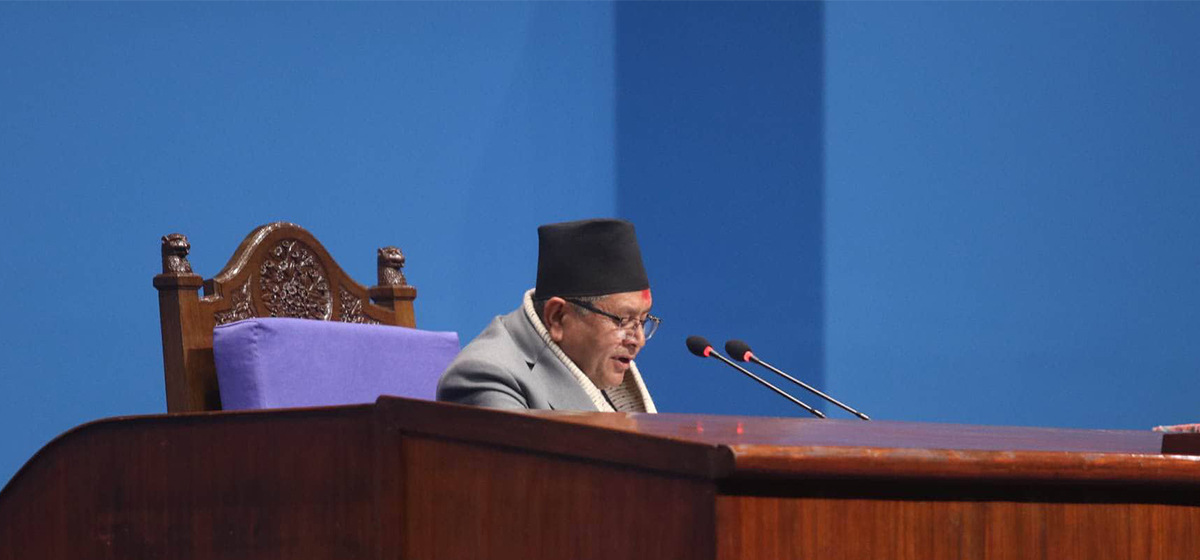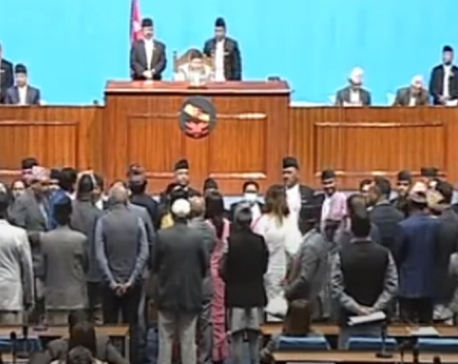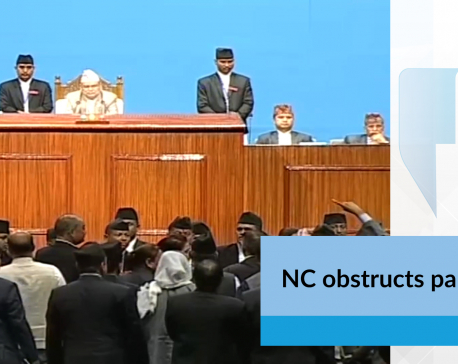
OR
#Editorial
Speaker Ghimire’s Neutrality Under Question
Published On: May 28, 2024 07:30 AM NPT By: Republica | @RepublicaNepal

The way Parliament is being run now indicates that the country is heading towards a serious political conflict. The Nepali Congress (NC), the largest party in the parliament, is currently on the main opposition bench. It is demanding a parliamentary committee to investigate the alleged involvement of Deputy Prime Minister and Home Minister Rabi Lamichhane and others in the embezzlement of cooperative funds. There is a consensus among opposition parties, including the Rastriya Prajatantra Party (RPP), on this issue. The CPN-UML and CPN (Maoist Center), currently in power in Parliament, want to forcibly move forward, leaving the main opposition and other opposition parties to continue their protests. Speaker Devraj Ghimire has become an ally in this effort of the ruling parties, mainly the UML. It is not normal to conduct the House while MPs are protesting. If the dissenting voices of the opposition parties in Parliament are not heard, it may lead to a serious crisis in the future. This situation has made everyone feel the need for a leader who can run Parliament with everyone's consent.
In the House of Representatives on Sunday, Speaker Ghimire decided to continue with the parliamentary proceedings even when MPs, including those from the opposition NC, were standing up and protesting. Amidst this uncomfortable situation, not only did the proceedings continue, but the economic survey for the Fiscal Year 2081/82 was also passed. A motion was passed to thank President Ram Chandra Paudel for presenting the policy and program in both houses of Parliament. According to the constitution, the budget must be presented on Tuesday (Jesth 15). Parliament meetings are always conducted based on consensus between the government and the opposition, giving opposition parties ample time and opportunity to put forth their concerns. It is a good democratic practice to listen to the opposition if there are obstacles or objections. But it is sad to note that there is selective behavior on the part of Speaker Ghimire in dealing with the obstruction of parliamentary proceedings. This is the same Parliament that did not proceed even as the UML obstructed it for almost two months. If the UML were in the opposition now, it is easy to guess what Speaker Ghimire would have done.
Although Pushpa Kamal Dahal has been made Prime Minister by chance, the UML holds the key to the government. It is not difficult to understand that Parliament is being run this way at the wishes of UML Chairman KP Sharma Oli, and the Speaker has merely aided him in this process. Almost all Speakers of the HoR in the past had ensured independence from the shadow of power. Damannath Dhungana, in the Parliament of 1990 formed after the democratic movement, made the assembly an excellent debate platform, giving ample space to the opposition parties. Most subsequent Speakers have followed that tradition. Despite being elected from the UML, the then Speaker Subas Nembang is still respected by many for his neutral stance. However, serious questions have been raised about Speaker Ghimire's role, likely leading the country to further conflict.
Should the Speaker decide to become an ally to the ruling parties' leader, our Parliament is likely to become further entrenched as a shadow of the government. In a democratic system, it is normal to see those in power being criticized in Parliament. But if Parliament is run autocratically or at the wishes of those in the government, preventing it from becoming a platform for debate, the situation will become serious. When there is no debate in Parliament, opposition parties will be forced to raise their voices through other platforms. The NC has already chosen to take to the streets as its demands were not heard. A system that does not address the grievances of the opposition parties cannot be democratic. There is no need even to keep the opposition's chair in Parliament if the ruling parties decide to bully them purely on the basis of their majority strength. There are already attempts to weaken our parliamentary system. Society is now sharply polarized, with social media exacerbating the situation. This has accelerated polarization everywhere, clearly indicating that the country is heading towards confrontation. If the proceedings of Parliament are carried out by imposing martial law, the idea of smooth parliamentary practice will prove to be a mirage.
You May Like This

NC wants either speaker or deputy speaker post in House
KATHMANDU, July 27: The main opposition party, Nepali Congress (NC), has demanded the post of either speaker or deputy speaker in... Read More...

NC obstructs parliament; next meeting to be held on Sunday
KATHMANDU, March 15: The main opposition party, Nepali Congress (NC), has obstructed the parliament. ... Read More...

NC obstructs parliament(with video)
KATHMANDU, Sept 16: Lawmakers of the main opposition party Nepali Congress are currently obstructing the proceeding in the House of... Read More...










Just In
- Heavy rainfall likely in Bagmati and Sudurpaschim provinces
- Bangladesh protest leaders taken from hospital by police
- Challenges Confronting the New Coalition
- NRB introduces cautiously flexible measures to address ongoing slowdown in various economic sectors
- Forced Covid-19 cremations: is it too late for redemption?
- NRB to provide collateral-free loans to foreign employment seekers
- NEB to publish Grade 12 results next week
- Body handover begins; Relatives remain dissatisfied with insurance, compensation amount







Leave A Comment